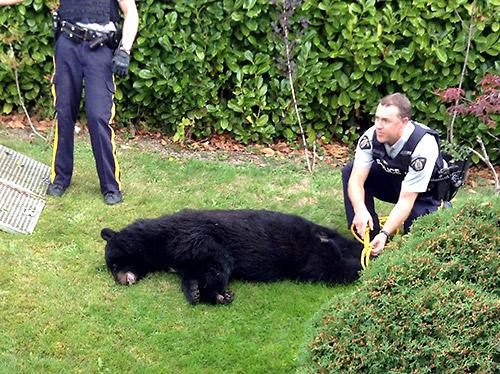Black bear encounters have doubled in Powell River since the start of September, leading to a number of the animals being destroyed, according to conservation officials.
Last week, one particularly aggressive bear was trapped and destroyed by a conservation officer near École du Soleil School at Egmont Street and Fairmont Avenue.
“One bear was acting aggressively, stomping feet, clacking jaws and approaching the officer with its head lowered,” said Andrew Anaka, a Powell River conservation officer who attended the incident. “The bear had numerous escape options of which it did not avail.”
This bear’s aggressive stance was probably related to its poor health. According to Anaka, the adult bear was thin with missing front teeth and had suffered an injury to its hindquarter that appeared to have healed.
“Bear sightings at or near schools during operational hours receive the highest priority,” said Anaka.
Anaka said the more people that are aware of how their behaviour affects bears, the better.
“If you think your unpicked fruit and nuts are causing no harm or benefiting the bears, think again,” he said.
Since the start of September, approximately 120 bears have been sighted in town and reported to Powell River’s conservation officer. Eight of those animals have been destroyed, said Anaka.
“Bears are more likely to take chances when there are food shortages,” said Chris Darimont, an associate geography professor at the University of Victoria who recently won an award for his research on wolves and bears and their importance to coastal ecosystems. “If natural foods are low or late elsewhere, they will likely take increased risk to find a meal.”
According to Francine Ulmer, WildSafeBC coordinator for Powell River, fall is typically when bears need to feed and fatten up for winter. Drought has been particularly hard on bears this year, driving them into town to feed when natural food sources fail.
“In years where wild food crops are doing poorly due to drought, there tends to be higher human-wildlife conflict in urban areas,” said Ulmer.
Conservation officers are very busy responding to public safety complaints. However, they have learned through experience that in many cases the conflict could have been avoided if residents would take responsibility for their attractants, according to Ulmer.
“Every fall, more bears are destroyed,” she said. “People need to know that they do play a role in the solution.”
Ulmer suggested that residents can contact Skookum Food Provisioners’ Cooperative for help picking fruit and the Let’s Talk Trash team to learn about proper composting.
For more information on living alongside bears without conflict, readers can go to wildsafe.bc.com.



